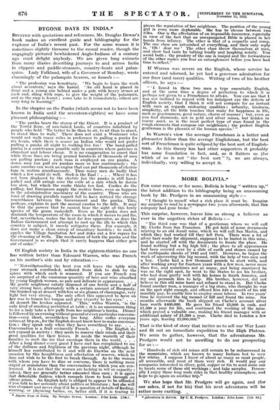MORE BOLIVIA.* Fon some reason, or for none, Bolivia is
being " written up," the latest addition to its bibliography being an unassuming book by Mr. Prodgers in an unassuming style :— " I thought to myself what a rich place it must be. Imagine my surprise to read in a newspaper two years afterwards, that this company had gone broke."
This surprise, however, leaves him as strong a believer as ever in the ungotten riches of Bolivia :—
" The third case was that of a gentleman whom we will call Mr. Clarke from San Francisco. He got hold of some documents relating to an old Jesuit mine, which we will call San Martin, and which they had worked till they left Peru. There were a lot of silver bars ready for shipment, supposed to be buried in this mine, and lie started off with the documents to locate the place. He found nothing but a big high hill ; the place to all appearances had been covered over by a slide of earth and stones caused by the earthquake shocks of 1842 and 1867. However, he began the work of uncovering this big mound, with the help of two men and a boy. Clarke had a few thousand pounds to start with, and after working away for fourteen years with a few men, never more than five, and sometimes not so many, and being convinced he was on the right spot, he went to the States to see his brother, who had done pretty well with his horses in South America, and try and persuade him to help. His brother, however, did not believe in this old mine hunt and refused to stand in. But Clarke found another man, a manager of a big store, who thought he was on the spot right enough, and offered him £40 a month of his £60 monthly pay, to enable him to employ more labour. In two years' time he removed the big mound of hill and found the mine. Six months afterwards the bank shipped on Clarke's account silver bars worth £400,000. He gave his friend £3,000 in cash, and £1,500 a year for life, and continued the working of the mine. which proved a valuable one, making his friend manager with an additional salary of £1,500 a year. Clarke died in London a few years ago, leaving £2,000,000."
That is the kind of story that incites us to sell our War Loan and fit out an immediate expedition to the High Plateau. We seem to gather, however, that the adventurous Mr. Prodgers would not be unwilling to do our prospecting for us :— •
" Hundreds of rich old mines still remain to be rediscovered in the mountains, which are known to many Indians but to very few whites. I suppose I know of about as many as most people, all accessible, and most of them very rich. It would pay any companies interested in silver, gold, copper or tin to send some one to locate some of these old workings ; and take samples. Person- ally I enjoy those long mule rides in that healthy atmosphere, and hope to go again on another trip."
We, also hope that Mr. Prodgers will go again, and (for our sakes, if not for his) that his next adventures will be rather more exciting.
• Adventures in Boliris. By C. H. Predgera. London: John Lane. 112s. dd.1


























































 Previous page
Previous page